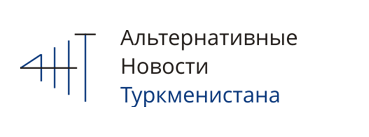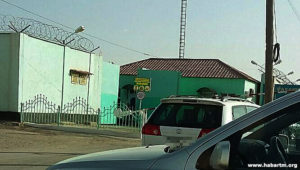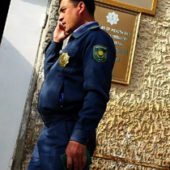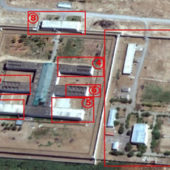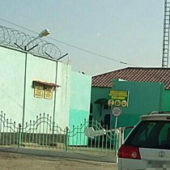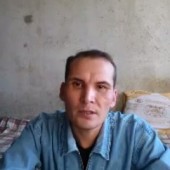ATN’s latest study of prison conditions reveals that in the maximum-security prison in the southern city of Tejen corruption is rampant. Everything has to be paid for, whether getting extra food parcels, having access to a cell phone or avoiding punishment. One relative of a prisoner claims that prisoners are treated as cash-cows for officials. This undermines the very goal of putting someone in prison – to correct him. ATN has monitored conditions in Turkmen prisons for many years. After each report, conditions improve for prisoners, but not for long.
Corruption is the principal shortcoming. Even the most junior prison guard is only interested in extracting money from prisoners, who are considered easy prey or slaves. In the maximum-security camp AH-K/6 in Tejen (in the photo), guards even ask for bribes from relatives to allow extra kilograms in the food parcels they bring to inmates. The guards then walk around the barracks and ask for food and soda drinks.
For the past four years, Meretgeldy Atabaev, the head of the camp, sat at the top of this pyramid of corruption. Prison heads are generally transferred to other prisons every two years, but he stays. Husein Hasanov, the mightiest among the prisoners and the camp chief’s right-hand, brings around 20,000 manat (around $1,000 at the market rate) to Atabaev every month. The cash is mostly extracted from inmates, but other prison officials pay tributes as well. There are ‘entry’ tariffs for each new inmate, which reaches $10,000 if the convict is a former official.
Any kind of violation could be a pretext for extorting money from inmates. Just one and a half years ago, the “fine” for being found in possession of a cell phone was 300 manats. Another 100 manats on top of that fee and the guards would give the phone back. Today, however, the violation alone would cost an inmate 1,300 manats. Jokingly, prison guards say the “tariffs” have increased because the manat has depreciated.
Should an inmate not be able to pay the bribe, he could be punished with time in an isolation cell or even sent out in the open, standing still for two days without food or water. Presented with a choice, many prefer the isolation cell.
To book an additional visit from relatives, the bribe is 100 manats per person. But relatives, who already have to care for the rest of the inmates’ needs, come rarely because they resent having to pay to see their loved ones in prison.
“The government provides high-quality food products and medicines, but none of that reaches the inmates. Instead, they can pay for these products if they want. In the canteens, they give out chunks of Indian buffalo and rotten potatoes. It’s impossible to eat like that,” a source familiar with the system said.
In mid-August, an inspection from the internal affairs ministry visited the prison. Inspectors found surprisingly low food supplies in the kitchen of the canteen, which could only feed 200 convicts, a fraction of the prison population in Tejen. The prison management, however, forced inmates to write and sign a document that stated that they voluntarily refused to eat.
ATN talked to relatives of the convicts, who said the prison is overpopulated. In December 2017, the Association of Independent Lawyers of Turkmenistan and the Turkmen Initiative for Human Rights reported that the prison hosts 2,400 inmates, despite having a capacity of just 850. In July 2018, ATN received reports that the prison population had grown to 3,400. According to the latest information gathered from sources close to the prison, around 1,200 inmates are held in Tejen. This figure, however, could be an underestimate, because it is forbidden for inmates to give information about the prison to their relatives.
“Prisons in Turkmenistan cannot be called a place for re-education, they are not correctional facilities,” wrote a relative of an inmate. “On the contrary, those convicted for simple economic crimes are faced with rampant corruption within the prison. They see for themselves how money can be extorted and how officials turn a blind eye to these violations. Injustice within the prison system turns the inmate bitter and isolated. In prison, the inmate is simply treated as a cash cow [that officials are eager to milk].”
